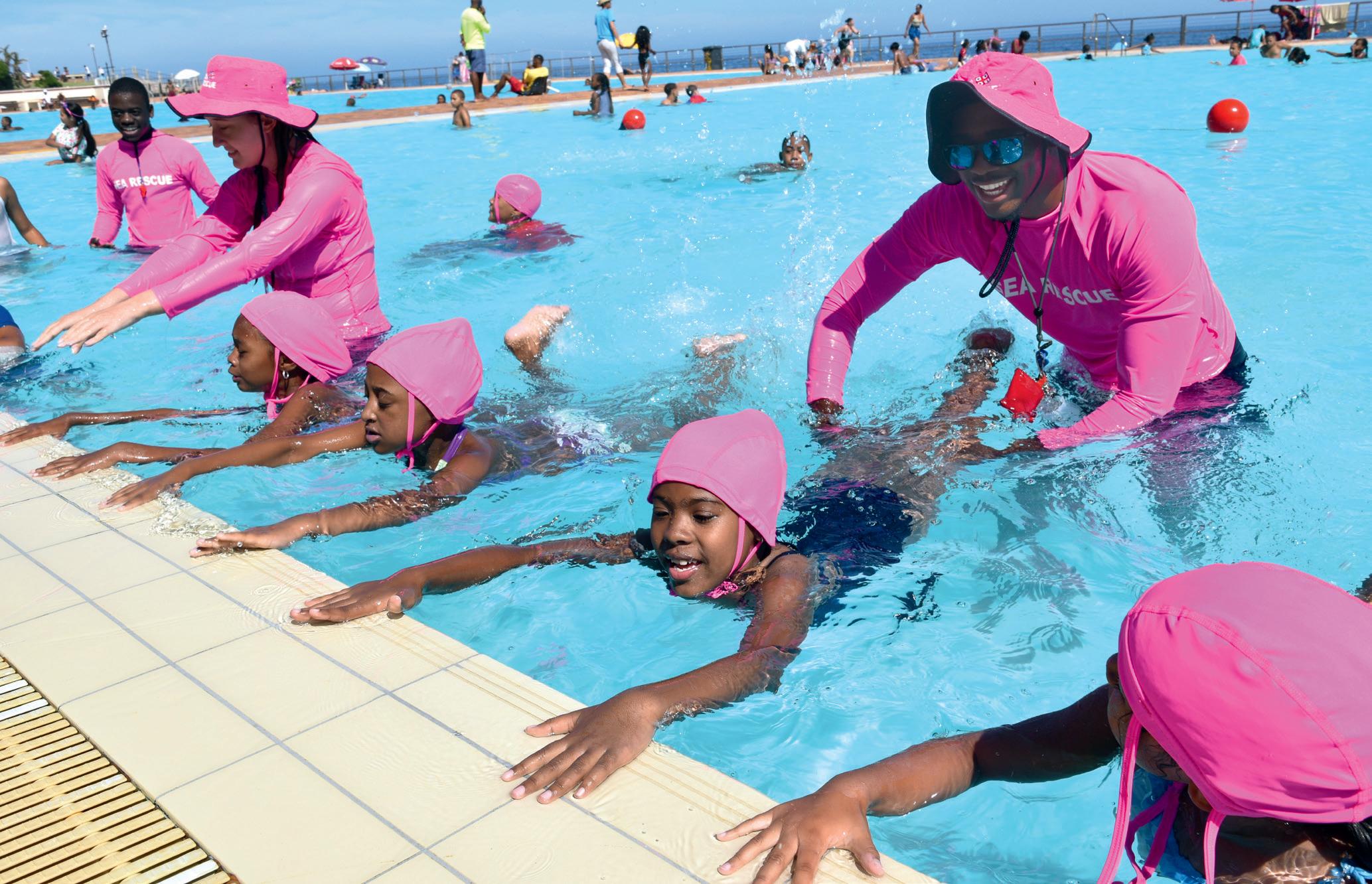
4 minute read
SURVIVAL SWIMMING LESSONS LAUNCHED
A new way to volunteer for Sea Rescue SWIMMING LESSONS: SURVIVAL
Sea Rescue has launched a Survival Swimming programme that teaches children the basic skills to stay afloat should they find themselves in difficulty in the water. Andrew Ingram tells us more about this rather colourful initiative.
THE COLOUR OF THE water at the Sea Point pavilion is a brilliant azure. It blends into the ocean behind it and the blue sky above. The picture it creates in one’s imagination is of a beautiful holiday, and the happy shouting of children swimming, splashing and having fun in the Cape Town municipal swimming pool only adds to this effect.
In the shallow pool there is a group of people wearing bright-pink vests and hats. The contrast with the water is remarkable, causing passers-by to stop and take another look. It is a Saturday morning and a Sea Rescue Pop-up Survival Swimming lesson is in full swing. On the pool deck a Sea Rescue volunteer, dressed in the same lumo-pink, is giving a water safety lesson to 12 children who are sitting in a group, listening attentively. In the water are four instructors, also wearing bright pink, each with three ‘students’.
The students, who have brightpink caps on, are at different stages of what looks just like a swimming lesson. One group is holding hands in a circle and putting their faces in the water. They blow bubbles through their noses and then have a good laugh at what they have just done. Another group is holding onto the wall and kicking for all they are worth.
The last three are floating on their backs, with their instructor beaming at them and offering advice. ‘Head back, head back … put your ears in the water,’ he encourages.
A student learning to float is one of the absolute highlights for the instructors. To be able to watch the face of one of your charges
and see them realise that they are floating unaided is just brilliant. Without exception, the sense of achievement is written all over their faces, and often that huge smile is the only reward the instructor wants. Sea Rescue is in the process of creating what we are calling Pop-up Survival Swimming squads. These squads are made up of v olunteers* from all walks of life who are strong swimmers and who would like to share the joy they get from swimming with disadvantaged children.
There are a number of issues for these children to overcome in learning to swim. Firstly, free swimming lessons are rare and therefore economic exclusion is real. Secondly many schools do not have swimming pools, so there is no chance of learning to swim at these schools like children at advantaged schools do. Our answer was to take volunteers to where disadvantaged children swim, develop a method of assessing their ability quickly, and then to upskill them free of charge. Sea Rescue’s national water safety team leader Eoudia Erasmus, who hails from Ceres, is leading the development of the lesson planning and practical exercises. With the cooperation of local schools, Eoudia, who has more than a decade’s experience in teaching swimming, chose children who could not swim and, lesson by lesson, child by child, worked out the most effective ways to teach a child self-rescue.
The initiative was developed after several recent stories involving children drowning a metre or two from safety. They would not have needed to swim 50 metres to survive; they would only have needed to know how to move as little as five meters through the water to get to safety.
Working alongside NSRI’s drowning prevention coordinator Yaseen Gamiet and with the support of the Princess NSRI’s Survival Swimming squad is unmistakeable. Here, they teach children the necessary skills to stay afloat and propel themselves to safety should they find themselves in trouble in the water.

Charlene of Monaco Foundation South Africa (PCMFSA), Eoudia soon whittled the lessons down to the bare bones. The children are taught how to control their breathing, orientate themselves in the water, float and then propel themselves to safety.
So, what if groups of volunteers could visit the places where children swim in order to assess their ability quickly and safely, and then upskill them in a 20-minute lesson?
For Sea Rescue’s full-time Survival Swimming instructors, this means offering free lessons in a local pool on a regular appointment basis. But it became apparent that there are so many children who need help that this traditional appointment method of teaching swimming was just not reaching enough children.
Before the first lessons at the Sea Point pool, our instructors went around asking parents whether they would like them to assess their children’s swimming ability and then improve their skills. Most gratefully accepted and stood at the side of the pool watching their little ones learn survival skills.
By the third time the instructors visited the pool, the children and their parents came to them. In one two-hour period, 55 children were assessed and upskilled by four instructors!
‘The best thing for me, as we’re setting up, is seeing children who were our students the week before, practising their floating,’ says Yaseen. ‘The pride that is written on their faces is priceless. And their new skills might one day save their lives.’ THANK YOU TO Sonwabo Ndandani, Principal Facility Officer at the Sea Point Pavilion and to the Friends of the Sea Point Pavilion for working with us on piloting this programme.











